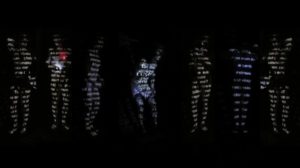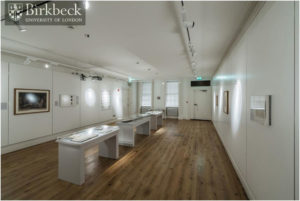Ralph Day
I joined the Peltz Gallery intern team at the beginning of the academic year 2017/18. Interns are employed on a 40-hour contract, and we manage our own time, deciding how much time we would like to give to organising our own public engagement event, promoting and evaluating events at the Peltz, and installing and de-installing exhibitions.

The internship is designed to fit around our own PhD research, and all three interns have been flexible in swapping responsibilities and supporting each other in our Gallery projects. As well as promoting public events at the Peltz and supporting the install of exhibitions, the major part of my work as an intern has been conceiving, organising and facilitating a public engagement event.
In May, the Wellcome-funded, internationally-touring exhibition, Transitional States: Hormones at the Crossroads of Art and Science, was installed at the Peltz Gallery. The exhibition explores feminist and queer perspectives on the role of hormones in contraception, fertility, menopause, and gender transition. By chance, this academic year also saw the emergence of the Birkbeck Feminist and Queer Theory Reading Group.

While meetings of this reading group normally take place in seminar rooms at Birkbeck, it seemed to me that it would be stimulating to stage a discussion of a queer text at the Peltz Gallery with the Transitional States exhibition in place. And what better text to discuss, in order to engage with the themes of the exhibition, than Paul B. Preciado’s Testo Junkie: Sex, Drugs, and Biopolitics in the Pharmacopornographic Era, which explores the author’s use of testosterone as a form of ‘gender hacking’. This proved timely, as Preciado had also been invited by the organiser of Transitional States, Dr. Chiara Beccalossi, to deliver a lecture about his work at the Wellcome Collection in June.

With my bid for funding approved by Birkbeck Gender and Sexuality (BiGS), I invited two specialists to contribute to the reading group meeting at the Peltz, to help us unpack the relationship between queer and feminist theory and (art) practice: Raju Rage, a London-based artist and activist whose video work at Transitional States makes reference to Testo Junkie; and Sofia Ropek-Hewson, a PhD candidate at the University of Cambridge who is writing her thesis about pharmacopornographic subjectivity in Preciado’s work. Spaces for this session quickly filled up, and it promises to be a valuable resource for the PhD and MA students involved. This may also signal the start of new partnerships between the Peltz Gallery and university reading groups.


